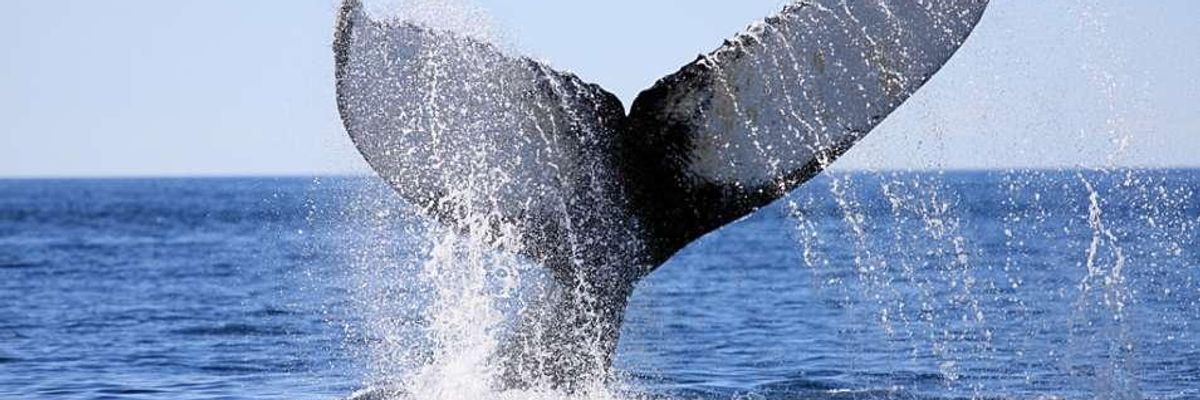

SUBSCRIBE TO OUR FREE NEWSLETTER
Daily news & progressive opinion—funded by the people, not the corporations—delivered straight to your inbox.
5
#000000
#FFFFFF
To donate by check, phone, or other method, see our More Ways to Give page.


Daily news & progressive opinion—funded by the people, not the corporations—delivered straight to your inbox.

The fate of whales is discussed by stakeholders around the world every four years at meetings of the International Whaling Commission, which Japan is reportedly planning to leave by the end of the year as it prepares to resume commercial whaling. (Photo: Cyrille Humbert/Flickr/cc)
"Japan has failed to bully the IWC into permitting a return to the cruel and outdated industrial whaling of the past. So now Japan is reportedly threatening to turn their back on international efforts to control whaling and conserve whales." --Darren Kindleysides, Australian Marine Conservation Society
"Japan has failed to bully the IWC into permitting a return to the cruel and outdated industrial whaling of the past," said Darren Kindleysides, CEO of the Australian Marine Conservation Society. "So now Japan is reportedly threatening to turn their back on international efforts to control whaling and conserve whales."
"This is a grave mistake which is out of step with the rest of the world," said Sam Annesley, executive director of Greenpeace Japan. "This snub to multilateralism is unacceptable and deeply concerning but let us not forget that the Japanese fleet has continued its operations in violation of the findings of the International Court of Justice (ICJ) in past years.
"Ultimately, the protection of the world's oceans and marine life needs global cooperation," Annesley added. "We hope that Japan will reverse its decision and take its place beside the nations trying to undo the damage human activities have done to whale populations."
Dear Common Dreams reader, The U.S. is on a fast track to authoritarianism like nothing I've ever seen. Meanwhile, corporate news outlets are utterly capitulating to Trump, twisting their coverage to avoid drawing his ire while lining up to stuff cash in his pockets. That's why I believe that Common Dreams is doing the best and most consequential reporting that we've ever done. Our small but mighty team is a progressive reporting powerhouse, covering the news every day that the corporate media never will. Our mission has always been simple: To inform. To inspire. And to ignite change for the common good. Now here's the key piece that I want all our readers to understand: None of this would be possible without your financial support. That's not just some fundraising cliche. It's the absolute and literal truth. We don't accept corporate advertising and never will. We don't have a paywall because we don't think people should be blocked from critical news based on their ability to pay. Everything we do is funded by the donations of readers like you. Will you donate now to help power the nonprofit, independent reporting of Common Dreams? Thank you for being a vital member of our community. Together, we can keep independent journalism alive when it’s needed most. - Craig Brown, Co-founder |
"Japan has failed to bully the IWC into permitting a return to the cruel and outdated industrial whaling of the past. So now Japan is reportedly threatening to turn their back on international efforts to control whaling and conserve whales." --Darren Kindleysides, Australian Marine Conservation Society
"Japan has failed to bully the IWC into permitting a return to the cruel and outdated industrial whaling of the past," said Darren Kindleysides, CEO of the Australian Marine Conservation Society. "So now Japan is reportedly threatening to turn their back on international efforts to control whaling and conserve whales."
"This is a grave mistake which is out of step with the rest of the world," said Sam Annesley, executive director of Greenpeace Japan. "This snub to multilateralism is unacceptable and deeply concerning but let us not forget that the Japanese fleet has continued its operations in violation of the findings of the International Court of Justice (ICJ) in past years.
"Ultimately, the protection of the world's oceans and marine life needs global cooperation," Annesley added. "We hope that Japan will reverse its decision and take its place beside the nations trying to undo the damage human activities have done to whale populations."
"Japan has failed to bully the IWC into permitting a return to the cruel and outdated industrial whaling of the past. So now Japan is reportedly threatening to turn their back on international efforts to control whaling and conserve whales." --Darren Kindleysides, Australian Marine Conservation Society
"Japan has failed to bully the IWC into permitting a return to the cruel and outdated industrial whaling of the past," said Darren Kindleysides, CEO of the Australian Marine Conservation Society. "So now Japan is reportedly threatening to turn their back on international efforts to control whaling and conserve whales."
"This is a grave mistake which is out of step with the rest of the world," said Sam Annesley, executive director of Greenpeace Japan. "This snub to multilateralism is unacceptable and deeply concerning but let us not forget that the Japanese fleet has continued its operations in violation of the findings of the International Court of Justice (ICJ) in past years.
"Ultimately, the protection of the world's oceans and marine life needs global cooperation," Annesley added. "We hope that Japan will reverse its decision and take its place beside the nations trying to undo the damage human activities have done to whale populations."